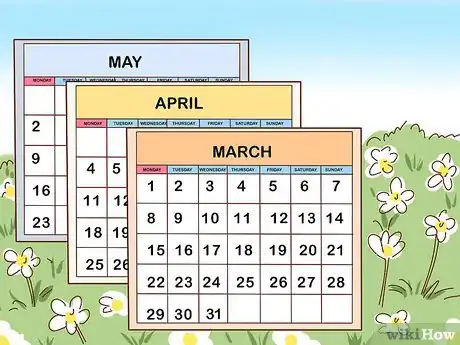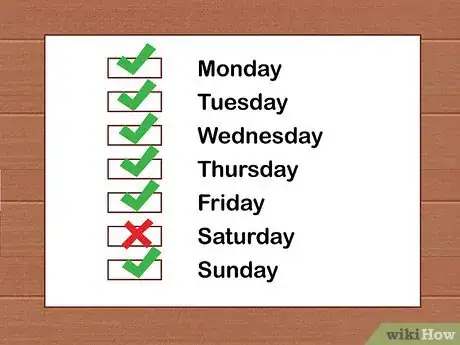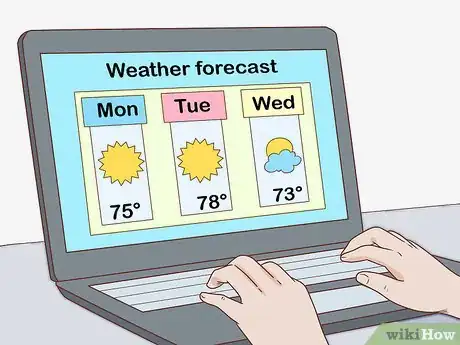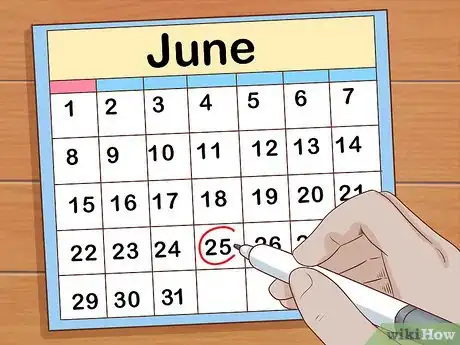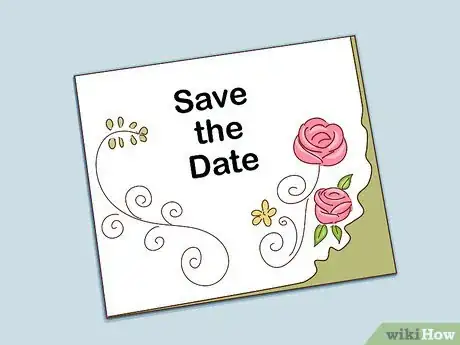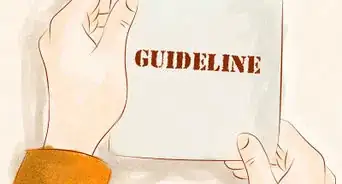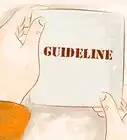This article was co-authored by Stefanie Chu-Leong. Stefanie Chu-Leong is the Owner and Senior Event Planner for Stellify Events, an event management business based in the San Francisco Bay Area and California Central Valley. Stefanie has over 15 years of event planning experience and specializes in large-scale events and special occasions. She has a BA in Marketing from San Francisco State University.
There are 7 references cited in this article, which can be found at the bottom of the page.
This article has been viewed 86,333 times.
You can plan your wedding around a season, a location, or a special date. If you are set on a specific venue, make sure to book it well in advance. Consider the budget of the wedding, the availability of the guests, and how much time you will need to plan your wedding. Remember: you and your fiancee are going to celebrate this anniversary for the rest of your lives—so pick something special.
Steps
Choosing a Date
-
1Consider whether there are any specific dates that are special to you and your significant other. Many wedding dates are related to a special day, like a birthday, the first day that you met, your first date to the movies, or the first time you kissed. If you really want a specific date, begin planning and calling around to venues and vendors you want to hire as early as possible. Wedding dates can be booked at least a year to several years in advance depending on the demand at a particular venue.
- For example, perhaps your dating anniversary date falls on a Saturday in June. Consider choosing that date so that your wedding date will always be the same as your dating anniversary.
- If you are pregnant, think about whether you want the wedding before or after the baby is born. Bear in mind that a late or early baby could throw a massive wrench into your works—so plan your wedding at least a few weeks (or months) before or after the baby is due.
-
2Plan around your honeymoon, if you plan to take one. If you know that you want to take your honeymoon in a specific place during a specific season, it may behoove you to pick a wedding date that fits with those plans. For example: if you are set upon a honeymoon in Thailand, you probably don't want to go during the monsoon season, from July to October — so you might plan a spring wedding.Advertisement
-
3Pick the season or the month in which you'd like to get married. If you are not too picky about a certain date, then begin to think about your favorite times of the year. Is there any month or season in which you would like to get married? The time of the year can affect your venue, wedding colors, theme, and even the menu, so it is an important first step. Once you've decided on spring, summer, fall, or winter, you can narrow it down to a certain month.[1]
- There are roughly three months in each season, so after you've decided on a season, pick the month in which you would prefer to get married. Do you want to get married toward the beginning of the season, or the end of the season? Consider the weather, holidays, and commitments you have in each month. Pick the one with the least conflict, and that best fits your specifications.
- Look at your schedule for the month. Do you have any prior commitments, important or inescapable conflicts? First and foremost, eliminate any days where the two of you will be busy or unavailable.
-
4Consider the day of the week. Saturday is the most popular day to get married, and consequently it usually the most expensive time slot. Depending on the venue, you may need to pay a premium to reserve a spot on a Saturday. Many couples are choosing to marry on off-days: Fridays, Sundays, or even midweek. Being flexible about the day of the week can make your wedding much cheaper than it would be otherwise.[2]
-
5Decide whether you want to be married indoors or outdoors. If you want to get married outdoors, it is especially important to consider the season. Think about the gown. If the bride has a dream gown in mind, it might not be appropriate for certain weather. For example, a velvet gown with fur trimming and long sleeves would make a hot summer wedding uncomfortable, as would a gauzy short-sleeved or sleeveless gown in the coldest part of winter.EXPERT TIPStefanie Chu-Leong is the Owner and Senior Event Planner for Stellify Events, an event management business based in the San Francisco Bay Area and California Central Valley. Stefanie has over 15 years of event planning experience and specializes in large-scale events and special occasions. She has a BA in Marketing from San Francisco State University.Owner & Senior Event Planner, Stellify Events

 Stefanie Chu-Leong
Stefanie Chu-Leong
Owner & Senior Event Planner, Stellify EventsOur Expert Agrees: Planning an indoor or outdoor wedding can play a significant role in the date you choose. If you want an outdoor wedding, choosing a time in November means you need to consider heat lamps and added costs. However, doing an indoor wedding in November means your guests can get more comfortable, and there might be fewer costs involved.
-
6Research the weather. Once you pick a season or a certain month, begin researching what the weather is like in the location you are planning on getting married. Pay close attention to the weather seasons in the location of your wedding, like tornado or hurricane season. Tropical storms can really mess up your dream beach wedding if you haven't considered picking a date outside of the peak storm season.
- The Farmer's Almanac is not exact, but it can be a helpful tool and also give you historical data on temperatures, rainfall, etc. for dates throughout history.[3] Most weather-forecast websites also log data regarding average temperature and rainfall for a given area.
-
7Think about how long you'd like to be engaged. Weigh this against how much time you think you'll need to plan your wedding. If you got engaged during the spring and your ideal wedding season is also the spring, you’ll likely be engaged for about a year. However, if you’re hoping to celebrate your wedding day within six months, you will be planning a fall or winter wedding. Know what’s most important to you and your fiance. You may need to compromise on the time or the season if the length of the engagement is the most important thing.[4]
-
8Consider the budget. It's generally more expensive to get married in the summer than in any other season. June, August, and September are the most popular marriage months. Some locations—especially touristy destinations—may be busier, and thus pricier, during certain times of year. Consider how you are financing the wedding: are you and your fiancee paying for it all yourselves, or are your parents helping out?[5]
- You do not necessarily need to compromise by getting married on the cheap on a snowy Wednesday in December. You may just need to plan far in advance and save up your money to make your dream wedding happen.
- Renting cars, hotels, and flights are extremely expensive on a holiday weekend. If you have friends or family coming from far away or out of the country, be aware pricey flights may prevent them from being able to come.
Guests and Other Considerations
-
1Ask yourself a few questions before you set the date:
- Are you and your fiancee able to take the time off work?
- Have you left enough time to organize everything?
- Do your family and friends already have any important commitments?
- Is your chosen venue free on a given day? If not: is the date more important, or the venue?
-
2Compromise with your fiancee. Talk to your partner, find out which season they like best, and compromise from there. The wedding is about the bride and the groom, not just one or the other. Both parties involved need to enjoy the occasion to ensure happy memories.
- If he likes winter and you like summer, you might compromise for either spring or fall. Consider conceding to have the wedding in the winter, but agreeing that you get to choose the location. Perhaps there is a location that is warmer than average in the winter or colder than average in the summer.
- If you want an outdoor ceremony and he wants it in a church, opt to have the ceremony in the church, but have the celebration afterwards in the church garden or other outdoor venue that you like.
-
3Consider your guests. Do they have any commitments or conflicts that will rule out certain weekends? Naturally, the date you choose won't be perfect for everyone. At the very least, be sure that all of your immediate family and other important "VIPs" will be available to attend. If any important people cannot make it on certain days, consider ruling out those times.[6]
- If you want to book your wedding near or on a major holiday, take into consideration that people might find it difficult to come to your wedding. For example if you want a wedding near Christmas, lots of people will already have made commitments. If all of your friends are into football, try not to set your wedding on Superbowl Sunday and make them choose.[7]
- Consider the cultures of your guests. Some religions have certain days during which they are required to fast (Ash Wednesday and Good Friday for Catholics or Ramadan for Muslims, for example). If you know you will be having guests with required fast days, having your wedding on one of these fasting days will make your guests feel alienated.
-
4Think about how far away guests will be coming from. Keep work schedules in mind, and make sure to give your far-away family and friends plenty of advance notice to make travel plans and take off work. If guests will be coming from out of town, or if you are having a destination wedding that requires guests to travel, you are effectively the host — so it is important that you consider how everyone will get there. This is especially true for international weddings, as passports can take weeks to arrive.
-
5Choose wisely. Remember is that this is the date on which you will celebrate your anniversary with your significant other for the rest of your lives. It needs to be memorable, but also make sense for the both of you — not only for what you want on the day of your wedding, but for years to come. If you get married on a holiday, for instance, your anniversary may be forever overshadowed by the festivities of that holiday.
Setting the Date
-
1Choose the venue. Find a day when it is available. The sooner, the better, so that you know you have the place you really want. Check out the spaces offered, the catering deals, the marriage fees, the ability to decorate a church or synagogue, wedding space, etc. Research into venues for the wedding and reception usually starts around the 12 months-to-go mark, with bookings occurring within the month once you've made up your mind.
- Find out whether the prices quoted cover everything or whether you'll be expected to pay for extras. Be aware that even church and synagogue venues may charge fees.
- Choose a place that fits the date you've chosen. If you've decided to get married in November, you probably don't want to get married in a place that gets a lot of rain and snow that time of year—unless you and your fiancee are into skiing. If you've decided to get married in July, consider whether you want an outdoor wedding or an indoor wedding.
-
2Set the date. After you've narrowed down the available times and made sure that your venue is available, you are able to pick the date! Make the reservations to set everything into stone, then write up some invitations and start inviting the special people in your life.
-
3Make reservations. Now that you know the date of your wedding, you can use it make reservations and set all of the arrangements into stone. Setting the date usually occurs at the same time you've confirmed the place of the wedding and the place of the reception. Start booking caterers, photographers, and other services. High-demand wedding photographers are often booked months in advance, and you want to make sure that you're prepared ahead of time.
-
4Finalize the guest list. Try to finalize the guest list by the time there are about seven months to go. Do expect some cancellations and possibly some last-minute additions due to illness, pregnancy, overseas travel, etc. It often can't be helped, so go with the flow.
-
5Send out the invitations. Send out "save the date" cards to your guests so that they have plenty of time to plan to be there. Once the venue and guest lists are confirmed, let everyone know what's coming up. Send emails if you know people will read them; otherwise, send cards to their postal addresses. Tell friends and family so they don't agree to go somewhere else and then not be able to come.
Community Q&A
-
QuestionHow do I choose who to invite when I'm on a budget?
 Community AnswerInvite immediate family and best friends. Don't worry about acquaintances, and obviously don't invite people you don't like.
Community AnswerInvite immediate family and best friends. Don't worry about acquaintances, and obviously don't invite people you don't like. -
QuestionMy girlfriend and I want to get married June 29, but her cousin is getting married this year on that day. Is it rude to get married on June 29, since it’s when we started dating?
 Tom De BackerTop AnswererNo, it's not rude. There are only 365 days in a year. It'll always be someone's birthday, death day, wedding day, divorce day, special day, holiday, other day, etc. There'll always be something bad that happened on that day in history. If it is significant to you, then you can choose that day, regardless of what else happened or is happening then.
Tom De BackerTop AnswererNo, it's not rude. There are only 365 days in a year. It'll always be someone's birthday, death day, wedding day, divorce day, special day, holiday, other day, etc. There'll always be something bad that happened on that day in history. If it is significant to you, then you can choose that day, regardless of what else happened or is happening then.
Warnings
- Avoid having your wedding on a weekday—many guests will be likely busy with work and other commitments.⧼thumbs_response⧽
References
- ↑ https://www.theknot.com/content/picking-the-perfect-wedding-date
- ↑ https://www.theknot.com/content/less-expensive-days-for-weddings
- ↑ http://www.almanac.com/weather/history
- ↑ http://theeverylastdetail.com/how-to-choose-wedding-date/
- ↑ http://lover.ly/planning/wedding-planning/10-things-to-consider-when-setting-your-wedding-date/7836/
- ↑ http://www.weddingwire.com/wedding-timeline/just-engaged/choose-your-wedding-date.html
- ↑ http://weddings.about.com/od/pickingyourweddingdate/a/weddingdates.htm
About This Article
To choose a wedding date, start by picking the season or the month when you want to get married. Consider whether there are any specific dates around that time that are special to you and your significant other, like the anniversary of the day you first met or the first time you kissed. Next, decide on the day of the week. Saturday is the most popular day of the week for weddings, but vendors also charge more on the weekends because of increased demand. Narrow your choice down to 2-3 options, then call your preferred venue to see which days they have available. For tips on considering your guests’ needs when choosing a wedding date, read on!


